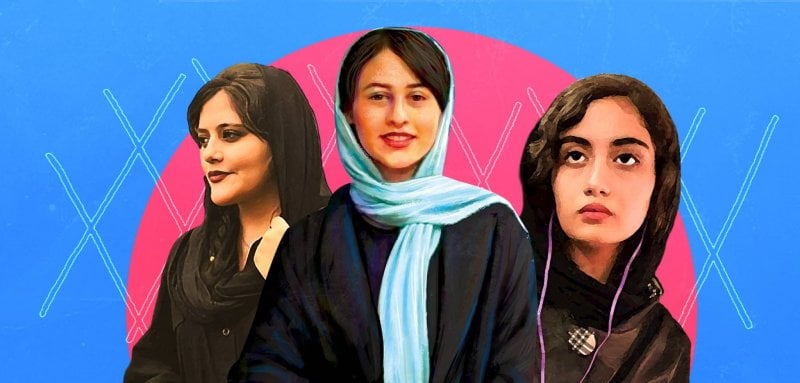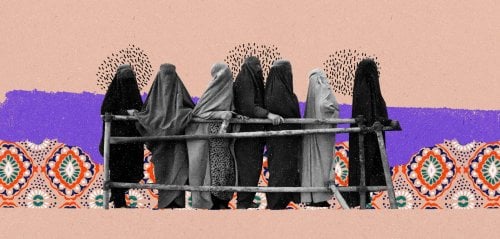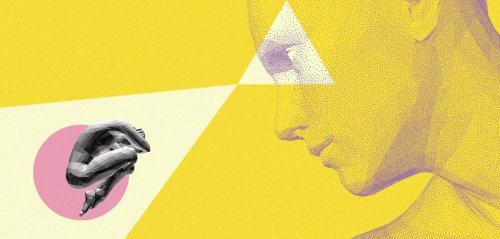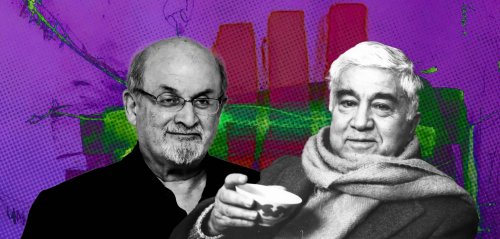The world is dark. It is five thirty in the morning. I’m sitting on our living room couch, and imagining the killing of girls, which I really have to stop doing. There are a few lights outside: the familiar street lights I know, and a flickering light in the distance I can’t quite place. From the living room, I hear the ticking of the clock I never look at for the time. From time to time, there’s a slight cough from my daughter Shahrzad coming from our bedroom, followed by the soothing sounds of her mother. Her sister, Salma, was in my arms earlier tonight, having fallen asleep soon after demanding a bottle. She might have been hungry, but she most probably just wanted to be with me. My wife Rasha likes to tell her friends that our Salma abuses her father. “When he’s not around she would easily fall asleep next to me. When he’s here, she needs to be picked up and carried by him.” Well if it is abuse, it goes both ways, I also need her warmth in my arms, on my body. Especially these days and nights, when I browse social media networking sites any time I’m awake, looking for news about Iran. I need to stop imagining the killing of girls in Iran.
In my city alone, you can find best selling authors, members of parliament, festival directors, university professors, scientists, and quite a few businesspeople. And we have all learned the art of hiding our wounds.
It’s hard to predict what will break you on any given day. We're strong people; Iranians. We have to be. I remember an ancient myth my father once told me; of a hero defending us, standing on a hill. He’d killed enemies left and right until no one else dared to attack. And just like this he stood strong, daring enemies to come at him. For three long days and nights, he stood there, sword and shield in hand, with no one stepping up, until a crow landed on his shoulder and picked out his eyes. He had long died of his wounds, but still refused to fall, in order to hold the enemies back as long as possible. We too carry on, even if the wounds are heavy. One wouldn’t be able to tell, seeing how accomplished and successful we are. In my city alone, you can find best selling authors, members of parliament, festival directors, university professors, scientists, and quite a few businesspeople. And we have all learned the art of hiding our wounds. Do not cry, I tell myself. There’s no telling when the tears will stop once you turn on that faucet. You must hold the hill you are standing on. But you never know when something might find the cracks and begin seeping in...
I just really need to stop imagining the deaths of girls in Iran.
It is a protest song by Ali Azimi and Golshifteh Farahani that resonates with me. What gets to me are not the obvious verses about the pain and injustice in my country, but rather that one repeated phrase taken from an old national anthem; "Ey marze por gohar…" ('Oh land of gems abound…') Or when I put on a song by the Pallett band, to hear, on top of the short wistful tunes of the flute, the words, "Dandelion, what news do you have? From where and from whom do you come?" I could just stop listening to Persian music altogether. Films are more predictable. When I saw the documentary film "Born in Evin", about a generation of babies born in a famously notorious prison in Tehran, I was ready to hear the graphic descriptions of violence and torture. Bring it on, I thought. But when the protagonist found another woman born in the same year, probably only a few cells down from where she was born, and asked her, “Did you notice how successful we are? All of us are survivors… Do you think we chose this success? This is how our parents take revenge on a regime that wanted to kill them. But we do not own it..”, that’s when the familiar feeling of a cold hand tightening my throat appears. It’s fine, I’ll live. I just really need to stop imagining the deaths of girls in Iran.
Then came the shooting down of the Ukrainian plane that was carrying our best and brightest in 2020 - mostly Iranian migrants that had settled in Canada - while returning from visits to family, visits to their "land of gems". Some had been visiting to attend weddings, or get wedded themselves. Till death do us part…
It’s not the first time we’re glued to our social media sites, hoping something will happen in Iran. We did it in 2009 and 2010, following the stolen elections, the mass protests, and the brutal crackdowns. We did it in 2019, when the internet was cut off during protests, and after communications resumed, we counted over 1,500 dead. Then came the shooting down of the Ukrainian plane that was carrying our best and brightest in 2020 - mostly Iranian migrants that had settled in Canada - while returning from visits to family, visits to their "land of gems". Some had been visiting to attend weddings, or get wedded themselves. Till death do us part…
Who could predict that the death of Jina (Mahsa) Amini would be the latest spark to drive our friends and relatives onto the streets? Killed as a Kurd, as a young woman. We were glued to our screens in order to see videos of daring protests, first in Kurdistan, then across the rest of Iran, attended by the young and old; images of women burning head scarves, standing defiantly in front of police in riot gear. (Through all this, a series of thoughts and emotions pass through me like wildfire); anger that the international news wasn’t covering it; retweeting, reposting, liking, adding hashtags. "Did you know that this celebrity is still silent? He’s such a coward. Did you hear the other one speak up?" Finally, he smelled a change in the air. If he had truly been with us, he’d spoken up sooner. And through all of this, why isn’t the international media speaking out? What about my Middle Eastern friends who always post about attacks on the Al-Aqsa mosque. These are my brothers and sisters on the streets, what are you waiting for? Where’s your solidarity? We were basically social media machines, and if you weren’t Iranian yourself, you'd look at us with a mix of wonder and pity.
Who could predict that the death of Jina (Mahsa) Amini would be the latest spark to drive our friends and relatives onto the streets? Killed as a Kurd, as a young woman.
When I take inventory of my wounds, I realize I’m one of the lucky ones. I have both parents. I didn’t lose any siblings. I have my dad’s stories of adventures with friends which of course invariably end with, "That’s before he was killed by this regime." I still have the family photos of my mother with her two cousins, teenagers still, when they disappeared and were found killed. But stories can be cut short; family pictures can be cropped. Why flee over mountains to leave Iran and everything else behind with it, but keep carrying them on our backs? I’m not like my friend who lost a father to a firing squad and still carries his stamp collection, or my other friend who lost a father but has his books of all his translations. I’m not like my friend who was born to a mother who, while pregnant with her, went from police station to police station to ask where her son was, and who had to grow up to find the proof herself decades later, that the brother she never met had been killed. I’m not like the friend who was born in prison and lived there the first seven years of her life. Most of them are parents now, like me. Somehow they decided life must continue. They never cry. They can’t afford to, but they hold on to their children; spoil them rotten. 'They are abusing their parents,' they hear, 'look how they cling to them'. It’s true, we say, knowing that this abuse goes both ways.
When I take inventory of my wounds, I realize I’m one of the lucky ones. I have both parents. I didn’t lose any siblings. I have my dad’s stories of adventures with friends which of course invariably end with, "That’s before he was killed by this regime."
After weeks (weeks!) had passed, the protests still kept going and the world had finally caught on. European and American celebrities have cut their hair in solidarity too. Non-Iranian friends now post messages of support and retweets like we do. There are plenty of videos of demonstrations in all the major and minor foreign cities. But what are the videos we get from Iran? A mass slaughter in Zahedan; shootings, beatings, arrest, torture, and the killing of students in a university in Tehran; whoever still takes to the streets. Teenage girls now, all of them, in high schools, ripping out pages with the faces of the Ayatollahs, pointing middle fingers to the supreme leaders, kicking out school principals. We can’t close our social media pages now. Is this it? Something like this has never happened; older men and women were driven out of the streets, and they still carry on? We try to conjure up new events by swiping through the same familiar accounts that post updates, but they all repost the same news. Can a girls’ revolution manifest change? Will the police hold back? The fuck they will. This revolt started with the killing of a young woman, they won't suddenly find their humanity overnight. Hadis Najafi, 22, met with bullets at a protest. Nika Shakarami, 16, disappears after telling a friend she’s fleeing from the police. Her mangled body was finally returned to her family more than a week later. An unfortunate accident. She fell while fleeing from the law. No one believes the story, so her body is stolen again, to be buried far from her home. Sarina Esmaeilzadeh, 16, is brought back to her parents; she had killed herself by jumping to her death. Her mother doesn’t accept the lie, and the pain drives her to commit suicide. 'See? It runs in the family..'
Is this it? Something like this has never happened; older men and women were driven out of the streets, and they still carry on?
I can’t stop looking at my phone. Everyone is on our side now. If you aren't, you live under a rock. But this can’t be the news. I keep scrolling and scrolling. I see videos of Hadis, Sarina, Nika; holding a mic, wearing a cute goth outfit, singing an old Persian song, a smile on her face; recording herself giving tips on how to decorate your room, tying her hair to bravely go into a demonstration. I see the picture of her (Which one? Does it matter?) lying on the ground, blood around her face. So peaceful; only her legs are at an awkward angle. I look at my girls as they sleep. They occupy the whole bed, leaving little room for me or my wife. Take it, it’s all yours. I remember my father telling me, "They were always brave, braver than us. I fought this regime for as long as I could, but I had to leave. I wouldn’t be alive today if I had stayed. On that last day, I remember the schoolgirls, fearless, jumping into the fight, throwing rocks, risking their lives. Lionesses. Get away old man, they told me. I was younger than you are today, but was already an old man. I will never forget that image."
And I sit here in the dark, knowing my girls are safe. Knowing there’s nothing in the world I can change. Knowing I need to stop imagining the killing of girls.
* The views and opinions expressed in this article are those of the author’s and do not necessarily reflect the official policy or position of Raseef22
Raseef22 is a not for profit entity. Our focus is on quality journalism. Every contribution to the NasRaseef membership goes directly towards journalism production. We stand independent, not accepting corporate sponsorships, sponsored content or political funding.
Support our mission to keep Raseef22 available to all readers by clicking here!
Interested in writing with us? Check our pitch process here!








